| SHADOWS ON THE WALL | REVIEWS | NEWS | FESTIVAL | AWARDS | Q&A | ABOUT | TALKBACK | |||||
 Shadows off the beaten path Shadows off the beaten pathIndies, foreign, docs and shorts...
On this page:
ATABAI |
THE GOOD BOSS |
WILD MEN
| |||||
| See also: SHADOWS FILM FESTIVAL | Last update 4.May.22 | |||||
|
Atabai Review by Rich Cline | 
| |||||
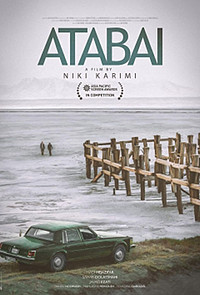 dir-prd Niki Karimi; scr Hadi Hejazifar with Hadi Hejazifar, Sahar Dolatshahi, Javad Ezati, Danial Noorvash, Yousofali Daryadel, Mahlagha Meinoush, Masoumeh Robaninia, Mojtaba Akbarzadeh Kahrizi, Majidaghebat, Amir Salj, Asghar Yousefi release Irn Feb.20 fff, UK 6.May.22 20/Iran 1h45 Is it streaming? |
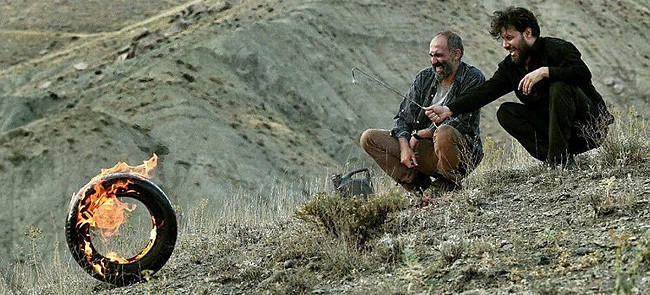 A fascinating mix of personal drama and cultural commentary, this Iranian drama has a naturalistic tone that mixes documentary-style realism with more soapy plot textures. As it follows a man on a journey into himself, the film circles around regrets, grudges and a variety of relationships, including family, friends and romance. Filmmaker Niki Karimi creates vivid characters and connections, adding imaginative touches and a nicely understated sense of humour. After working abroad for 15 years, middle-aged architect Kazem (Hejazifar) returns to his home village in rural northwest Iran. But this brings back memories of his sister, who took her life while in an abusive forced marriage. Kazem blames this on his harsh father (Daryadel) as much as her vile husband, who has sold her orchard to cover his debts. This has also strained Kazem's relationship with his best friend Yahya (Ezati), who has just lost his wife. And he also begins to fall for Sima (Dolatshahi), the eldest daughter of the orchard's new owner. "Atabai" is a term of respect that Kazem expects people to use, even though he feels that he doesn't deserve it. Throughout the film, there are thoughtful interludes featuring dreamy imagery and introspective voiceovers that offer glimpses into Kazem's heart, namely the things he can't say aloud. Meanwhile, Karimi peppers the film with lovely local culture, including surprising visuals, running gags and witty moments such as when old men in a car comment on the emotional power of Lady Gaga singing Shallow, even though they can't understand the words. Hejazifar gives Kazem a remarkable intensity, especially when he erupts after holding his anger in for so many years. This bitterness eats away at him, especially in scenes with Daryadel as his hapless father. He finds terrific rhythms with Ezati's thoughtful Yahya, cleverly played to build toward an honest confrontation. Their trip into the countryside and to a lake where they swam as children is beautiful, complete with a shattering revelation. And his close connection with goofy nephew Aydin (Noorvash) bristles with nuance. The film is essentially an odyssey in which Kazem confronts his attitudes, dealing with the things from his past that haunt him while trying to find a way to move forward. In this sense, his romance with Dolatshahi's smart, observant Sima is almost an afterthought, which might make the film feel a bit unfinished. But the fact that she is also scarred from her life adds significant insight. What emerges is a realistic exploration of the redemption that's possible when you start dealing with your anger.
| ||||
|
The Good Boss El Buen Patrón Review by Rich Cline | 
| |||||
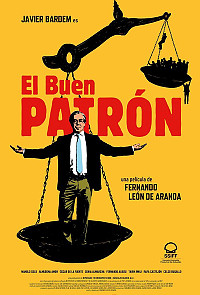 dir-scr Fernando Leon de Aranoa prd Fernando Leon de Aranoa, Jaume Roures, Javier Mendez with Javier Bardem, Sonia Almarcha, Manolo Solo, Almudena Amor, Oscar de la Fuente, Celso Bugallo, Fernando Albizu, Tarik Rmili, Rafa Castejon, Yael Belicha, Nao Albet, Martin Paez release Sp 15.Oct.21, US Jan.22 psiff, UK 15.Jul.22 21/Spain 2h00  Is it streaming? |
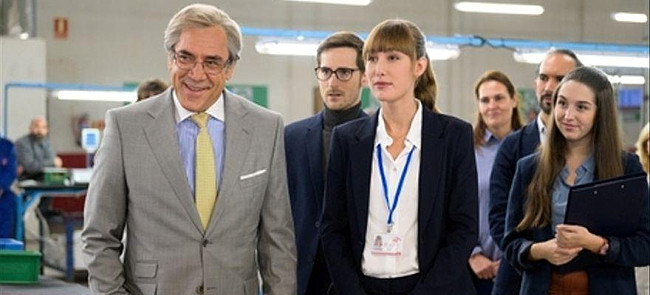 Pitch-black undercurrents swirl throughout this Spanish comedy, which tells a sharply engaging story while unpicking a range of issues. At the centre, writer-director Fernando Leon de Aranoa is exploring how impossible it is for any business to properly care for its employees. And the witty, loosely satirical story touches on the dangers of meddling in other peoples' lives while maintaining the illusion that everything is fine in yours. With his scale factory a finalist for a regional Excellence in Business award, Blanco (Bardem) is keen to be seen as a father figure by his employees. But disgruntled sacked worker Jose (de la Fuente) picks this day to make some noise, turning up with his kids and demanding his job back. Turned away, he launches a campaign to sabotage Blanco's award. But there are other problems on Blanco's mind as the day of the prize committee's visit approaches. And to make matters even worse, Blanco finds himself attracted to young trainee Liliana (Amor). Cleverly interweaving several plot threads, the narrative centres on how Blanco wants his company to feel like a family, going out of his way to solve issues in his employees' personal lives. So when manager Miralles (Solo) falters in his work, Blanco intervenes in Miralles' marital problems, unravelling a web of complications in the process. And assisting another employee (Bugallo) causes trouble for Blanco's wife (Almarcha). The script is packed with amusing wordplay that's impeccably understated by the naturalistic cast. Bardem's performance is fiercely inventive, layering everything with a whiff of passive aggression while maintaining Blanco's soft-spoken and achingly understanding exterior. So much so that we think we're imagining the low-life thug he seems to be. This makes watching his world spiral out of control both entertaining and oddly involving, especially when he begins to blow his top. And the finely played surrounding characters are equally unflappable, facing conflicts with their own remarkable steeliness. This is a strikingly well-made film that works simultaneously on various levels as it heads into a properly outrageous final act that's impossible to predict. Either Blanco will use his years of privilege to efficiently keep all of these balls in the air, or his entire life is about to crash down around him. And there's a deeper, more important angle to the story in the way it surgically eviscerates the chasm between the haves and the have-nots. Breathtakingly sharp, the film takes no prisoners.
| ||||
|
Wild Men Vildmænd Review by Rich Cline | 
| |||||
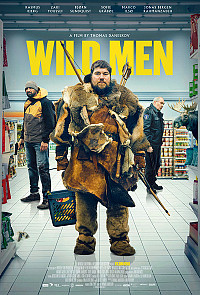 dir Thomas Daneskov prd Lina Flint scr Thomas Daneskov, Morten Pape with Rasmus Bjerg, Zaki Youssef, Bjorn Sundquist, Sofie Grabol, Marco Ilso, Jonas Bergen Rahmanzadeh, Hakon T Nielsen, Tommy Karlsen Sandum, Rune Temte, Camilla Frey, Katinka Evers-Jahnsen, Thea Lundtoft Larsen release US Jun.21 tff, Den 3.Feb.22, UK 6.May.22 21/Denmark 1h44 Now streaming... |
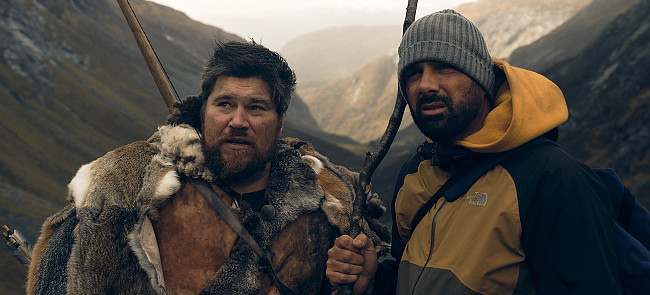 Blackly comical, this Danish adventure explores issues around masculinity from a variety of witty angles. Set in spectacular Norwegian countryside, the script takes the needed time to deepen the characters along the way, offering both emotional resonance and some bigger commentary about modern society. Along with the action, there's some random slapstick and a dose of Scandinavian gloom. It's rare to find a ripping thriller with such smart undercurrents. After going native in Norway's snowy mountains, fur-clad Martin (Bjerg) occasionally raids local shops for supplies, creating a myth about a "viking" robber. Then he finds fellow Dane Musa (Youssef) injured in the woods and stitches up his wounds. Musa doesn't reveal that he's a drug dealer on the run, or that he was separated from his cohorts (Ilso and Rahmanzadeh) after a car crash. They're after him, as is Detective Oyvind (Sundquist). Meanwhile, Martin has told his wife Anne (Grabol) that he's at a conference, and now she's coming from Denmark to find him. While conversations are played for laughs, they are bracingly realistic discussions that amusingly touch sensitive nerves for the audience. Most of the deadpan dialog surrounds the absurdities of the situation. "Either he's lost his marbles," Oyvind says of Martin, "or he's part of an international drug-smuggling gang." And Musa gets quickly fed up with Martin's know-it-all advice about communing with nature, then develops a mutual respect. Performances are earthy and realistic, never playing up the silliness. Bjerg has likeable presence as the burly Martin, misguided and selfish but never malicious. He and Youssef nicely underplay Martin and Musa's growing friendship, which has some proper depth as they begin to confront the truth of their situations. Martin's happy home-life was suffocating him; Musa has been excluded from his due to his criminal record. Sundquist's worn-out Oyvind is sympathetic. And there are even textures of meaning for the minor side characters. Martin's theory is that men are better off if they're alone, out hunting like their Stone Age ancestors. So while he's thrilled to stumble into an old-style viking village, he's horrified that it's actually a tourist trap. Comments from various characters touch on the fragility of masculinity, including one particularly bleak anecdote about endemic homophobia. So even with its sense of humour, where this story goes is often harsh and painful to watch. But it's also an entertaining and moving affirmation that being a man has nothing to do with ancient ideas about manliness.
| ||||

See also: SHADOWS FILM FESTIVAL © 2022 by Rich Cline, Shadows
on the Wall
HOME | REVIEWS | NEWS | FESTIVAL | AWARDS
| Q&A | ABOUT | TALKBACK | | ||||

